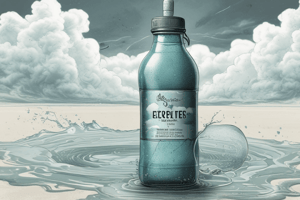Podcast
Questions and Answers
What is the primary function of the nephron in the kidney?
What is the primary function of the nephron in the kidney?
- Producing urine
- Storing electrolytes
- Filtering blood (correct)
- Regulating blood pressure
Which of the following electrolytes is primarily found in extracellular fluid?
Which of the following electrolytes is primarily found in extracellular fluid?
- Magnesium (Mg+)
- Sodium (Na+) (correct)
- Potassium (K+)
- Calcium (Ca+)
What component is NOT a part of urine composition?
What component is NOT a part of urine composition?
- Water
- Urea
- Chloride
- Glucose (correct)
How do electrolytes primarily function in the body?
How do electrolytes primarily function in the body?
What is the main dietary source of sodium commonly consumed?
What is the main dietary source of sodium commonly consumed?
What is the primary cause of most hypertension cases?
What is the primary cause of most hypertension cases?
Which dietary mineral is recommended to help relax blood vessels and potentially lower blood pressure?
Which dietary mineral is recommended to help relax blood vessels and potentially lower blood pressure?
What is a key lifestyle change recommended for managing hypertension?
What is a key lifestyle change recommended for managing hypertension?
Which of the following is NOT a component of the DASH eating plan?
Which of the following is NOT a component of the DASH eating plan?
Which food source should be limited to help control sodium intake and manage hypertension?
Which food source should be limited to help control sodium intake and manage hypertension?
What is the primary dietary source of sodium for most individuals?
What is the primary dietary source of sodium for most individuals?
Which mechanism describes the movement of water across cell membranes?
Which mechanism describes the movement of water across cell membranes?
What is the adequate intake (AI) for potassium for adults?
What is the adequate intake (AI) for potassium for adults?
Which electrolyte plays a key role in nerve transmission along with sodium?
Which electrolyte plays a key role in nerve transmission along with sodium?
What is the Tolerable Upper Intake Level (UL) for sodium for adults?
What is the Tolerable Upper Intake Level (UL) for sodium for adults?
What type of foods have a naturally low chloride content?
What type of foods have a naturally low chloride content?
What is the main consequence of dehydration on electrolyte balance?
What is the main consequence of dehydration on electrolyte balance?
What percentage of sodium chloride is made up of chloride?
What percentage of sodium chloride is made up of chloride?
Study Notes
Dietary Sodium And Chloride
- Processed foods are the main dietary source of sodium
- Sodium is added to foods for taste and as a preservative
- Very little sodium comes from naturally occurring sources
- Adults under 50 should consume no more than 1,500 milligrams (mg) of sodium per day
- Those over 70 should aim for 1,200 mg of sodium per day
- The upper limit for sodium is 2,300 mg per day
- Most food sources are low in natural chloride
- Table salt, or sodium chloride, is about 60% chloride
Dietary Potassium
- The recommended daily intake of potassium is 4,700 mg
- Most Americans do not consume enough potassium
- Fresh fruits, vegetables, legumes, milk, meats, whole grains are good sources of potassium
- Salt substitutes containing potassium chloride (KCl) can also be a source of potassium
Functions Of Electrolytes
- Electrolytes including sodium, potassium and chloride play an important role in water and electrolyte balance
- Movement of electrolytes and water across cell walls happens through two processes: diffusion and osmosis
- Diffusion is the movement from an area of greater concentration to an area of lesser concentration
- Osmosis is the movement of water across a membrane from an area with fewer particles to an area with more particles
- Electrolytes are essential for maintaining normal blood pH
Sodium, Potassium, and Chloride In Nerve Transmission
- Sodium and potassium carry a charge when dissolved in water
- This charge helps with the function of excitable cells in nerves
- As sodium moves into the cell, potassium moves out
- Nephrons, microscopic structures in the kidneys filter blood
- Each kidney contains one million nephrons
- The composition of urine includes: water, electrolytes, urea, and creatinine
Electrolytes: Sodium, Potassium, And Chloride
- Electrolytes are minerals that become charged particles when placed in water
- Cations are minerals with a positive charge
- Anions are minerals with a negative charge
- Sodium (Na+), potassium (K+) and chloride (Cl-) are electrolytes important in water balance
- Sodium (Na+) is the main cation present in extracellular fluid
- Potassium (K+) is the primary intracellular cation
- Chloride (Cl-) is an anion and is more concentrated in extracellular fluid
Dietary Sodium
- Health professionals recommend decreasing sodium intake.
- The majority of sodium in our diet is not from salt added during cooking.
- Excess sodium intake increases the risk of coronary heart disease, stroke, and kidney damage
- 85% of hypertension cases are caused by unknown factors
- Hypertension due to unknown causes is known as essential hypertension
- Most hypertension can be treated with dietary and lifestyle changes, as well as medication
Dietary Changes For Blood Pressure Control
- High sodium intake may increase the risk of hypertension in some people
- Food labels contain sodium information
- Potassium helps to relax blood vessels, which can reduce blood pressure
- Increasing potassium intake is recommended
- Calcium and magnesium can also be beneficial in managing blood pressure
Hypertension And Diet
- The Dietary Approaches to Stop Hypertension (DASH) eating plan emphasizes consuming more of the following: fruits, vegetables, whole grains, and low-fat dairy products
- The DASH diet increases potassium, magnesium, and calcium intake.
- It also recommends reducing saturated fat intake
- To help prevent/control hypertension, lower sodium intake and avoid/limit processed foods and fast foods
- Lifestyle changes, such as maintaining a healthy weight and participating in regular physical activity are also recommended.
Studying That Suits You
Use AI to generate personalized quizzes and flashcards to suit your learning preferences.
Related Documents
Description
This quiz covers essential information about dietary sodium, potassium, and chloride, including their sources, recommended daily intakes, and functions in maintaining electrolyte balance. Understand the importance of these electrolytes in your diet and how they affect overall health.




